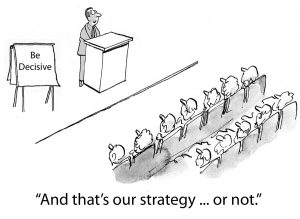The Decisive Leader has impact and influence
 Have you ever let a pending decision freeze you? You know a choice has to be made. All of the options have pros and cons associated with them. You feel like EVERYTHING is hinging on this one decision you need to make. What do you do? The decisive leader knows how to make critical decisions and acts in the best interest of the team.
Have you ever let a pending decision freeze you? You know a choice has to be made. All of the options have pros and cons associated with them. You feel like EVERYTHING is hinging on this one decision you need to make. What do you do? The decisive leader knows how to make critical decisions and acts in the best interest of the team.
It seems one of the most difficult and terrifying things we do as an individual or a leader is making decisions. In the background is this agonizing thought that somehow the decision we make is going to send us irrevocably in the wrong direction and it will lead to disaster.
Over time, we find that it’s just not true. There will almost always be a way to recover.
Frozen by Fear
Why do we get that way? What is it about making a decision that can seize us up? To understand that more, let’s first understand three of the decision maker types that lead to mistakes.
- Snap Decision-makers who take immediate action because they think they need to act quickly. They fail to explore options or gather information before making a decision. They go on initial gut instinct. Sometimes that works and sometimes it doesn’t. When it doesn’t work, it can be disastrous.
- Deliberative Decision-makers want to make sure they weigh all the options and have ALL the information before making a decision. The problem is you will NEVER have all the information and often if you deliberate too long you can miss valuable opportunities. In fact, sometimes collecting too much data complicates decision making. We get “paralysis by analysis”.
- Never Decision-makers are ones who don’t ever make a decision. They feel the weight and importance of every decision. As mentioned earlier, they feel that everything is crucial and they fear the wrong decision. So they (often intentionally) don’t make the decision. Of course, not making a decision IS a decision and one that almost ALWAYS leads to disaster.
“Inability to make decisions is one of the principal reasons executives fail. Deficiency in decision-making ranks much higher than lack of specific knowledge or technical know-how as an indicator of leadership failure.” -John Maxwell
The Decisive Leader
 Being a decisive leader doesn’t always mean that you are the only one who can decide. Don’t fall into that trap! It’s what ties even the most decisive person up in knots and can lead to poor decision making.
Being a decisive leader doesn’t always mean that you are the only one who can decide. Don’t fall into that trap! It’s what ties even the most decisive person up in knots and can lead to poor decision making.
It does mean, however, that you know when decisions need to be made and you influence having them made at the right time.
The good news is that there ARE ways to make better decisions and make them faster and easier. It will never be easy, but it can be easier. And it starts with applying three keys.
Know your core values
Core values are the principles that determine who you are and what you are about above all else. Core values are the soul of the individual or organization. Your core values are unshakable – no matter what you will always reflect these values in everything you do.
They also help establish the non-negotiables. These are the things you will not give up or change no matter what changes around you.
For a decisive leader, core values tell them which options to take off the table and which remain viable. If it violates a core value, it simply isn’t under consideration.
“It’s not hard to make decisions when you know what your values are.” –Roy Disney
Here’s a key tip on core values. If they aren’t written down somewhere, you don’t really know your core values. You want to have them written down where you can refer to them again and again. Another advantage of core values is discussed here.
focus on your purpose or intent
You have likely heard of the book by Simon Sinek titled Start With Why. In the book, Sinek talks about how purpose – our why – drives what we do. When we look at our options and think about only about WHAT to do, it becomes strictly a balance sheet of pros and cons. Decision making can become harder, especially when the choice on the balance sheet just doesn’t FEEL right.
The decisive leader knows that the best option is the one that matches up with our purpose or with the outcome we intended. it may not come out on the balance sheet, but it is more in line with who we are and what we are about.
As you look at the options of a decision, examine each as to how they match up to BOTH your core values and your intent or purpose. If they don’t match up to both, it is probably not the best option for you.
A while back I was approached with the opportunity to do a series of training programs. The opportunity would take time to develop and deliver yet would also be a good income generator. The challenge was that it was a subject matter I am not really expert on and it wasn’t really consistent with my focus area. On the other hand, as an entrepreneur, I don’t like to turn down money making opportunities when they come along.
I said no. While the opportunity would not compromise any of my core values, it was not consistent with my purpose. Despite the chance to generate income, it was not consistent with my purpose.
seek wise counsel
 Before we talk about counsel keep in mind that every decision does not necessarily need to be made by you alone. The decisive leader knows when a collaborative or delegated decision is better than a command decision.
Before we talk about counsel keep in mind that every decision does not necessarily need to be made by you alone. The decisive leader knows when a collaborative or delegated decision is better than a command decision.
When the decision is yours alone that does not mean that other perspectives and feedback have to be excluded. In fact, the decisive leader takes advantage of the resources available to them to make better decisions.
This is one of the advantages of having an Inner Circle. That’s a group of people you can rely on (and often they rely on you) for being a sounding board. They should have values similar to yours. You are confident in trusting opinions. They will not be “yes men” but will hold you accountable. Share your challenges and thoughts with them. Allow them to ask you questions. They will then give you perspective and help you consider options. THE DECISION IS STILL YOURS TO MAKE! Yet wise counsel can help guide you in making better and more confident decisions.
Coaches make a very useful part of your inner circle. My motivation and purpose is to help you be successful. Schedule a free Discovery Strategy Sessiontoday and see how I can help you. or contact me atpsimkins(at)BoldlyLead.com .


